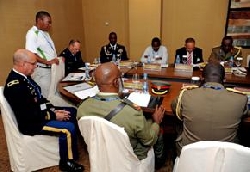U.S., African Military Chaplains Collaborate at Conference

Contact: Staff Sergeant R. J. Biermann, CJTF-HOA Public Affairs, U.S. Africa Command Press Office, +49 (0)711-729-4714
DJIBOUTI, Sept. 24, 2012 /Standard Newswire/ -- More than 20 military chaplains from U.S. Africa Command (AFRICOM) Combined Joint Task Force - Horn of Africa (CJTF-HOA) and nine East African countries joined together September 19 to 21, 2012, for the third annual AFRICOM-sponsored African Military Chaplain Conference in Djibouti City, Djibouti.
DJIBOUTI CITY, Djibouti - A group of military chaplains bow for prayer, while Botswana army Chaplain Colonel David Taote Mapitse prays during the 2012 African Military Chaplain Conference introduction September 18, 2012, at the Kempinski Hotel in Djibouti City, Djibouti. The purpose and theme of the three-day conference was to partner, collaborate and minister with one another to help improve the chaplain corps' ability to better serve its service members. (Combined Joint Task Force - Horn of Africa photo by Staff Sergeant R.J. Biermann)
The purpose of the gathering, as the year's theme included, was to partner, collaborate and minister with one another to help improve the chaplain corps' ability to better serve its service members. According to U.S. Air Force Colonel Jerry Lewis, AFRICOM chaplain, the conference did just that.
"When you talk about building partnership capacity, that's the key element of the chaplain function area," Lewis said. "[We've introduced a] forum for them so they can come together and induce the collaboration and partnership so they can take back … elements of ideas and thought processes."
According to Nigerian Air Force Colonel L.A. Lawal, command chaplain, the importance of these ideas and process is essential across East Africa.
"[This conference] is very important because … the operation from one country to another affects one another," Lawal said. "The need for us to understand one another, to understand the thinking of one another and how to [understand] what is oppression and where you come from [is important]. We go a long way in assisting others."
Each day of the three-day conference focused on a specific knowledge area. These included combat stress and resiliency, chaplains as advisers to leaders and professional ethics. To some attendees these subjects had never been considered within their armed forces.
"I have learned about the role of the chaplain in contributing to leadership … [to] take part in leading and in helping leadership," said Ghana Armed Forces Lieutenant Colonel David Banownuma Bangsiibu, chaplain. "This conference has dealt with the key issues that were important for effective chaplaincy in the armed forces. I think we have gone a long way to build bridges, not just among ourselves, but among our various nations through this conference."
To other first-time attendees the conference was a means to network and learn.
"This conference is my maiden addition," Lawal said. "It's is a huge success and very interesting. It's broadened my horizon and I've gained more knowledge. The collaboration and cooperation that's expected at the outcome of these conferences has been tremendously beneficial for me."
The conference even marked the first trip for some AFRICOM chapel staff members.
"I thought it was just amazing," said U.S. Army Sergeant Maj. Albert Jackson, AFRICOM command chaplain senior enlisted adviser. "I really appreciate, first, to even experience something like this and just the caliber of soldiers and chaplains that we have in the different nations that are just communicating different issues and different concerns. The way they are sharing ideas and sharing concepts and … coming together to help one another; it's just been amazing to me."
For many the bonds had already been formed during previous conferences.
"When they arrived here in the lobby, it was like a homecoming," Lewis said. "We didn't have that two years ago -- that sense of synergy among the senior chaplains."
For the first-timers, the purposeful conference structure helped develop these bonds.
"We've been intentional all week," Lewis said. "At lunchtime we have a requirement. We must sit with different groups. In small groups we bounce around to different groups, so at the end of the week they have another friend, another partner of which to do ministry with in Africa."
Chaplain Lewis envisions simple changes for next year's conference.
"Our hope and prayer is that we can expand it," Lewis said. "We started with four and eight [chaplains] and we'd hoped for 12. Next year we're trying to budget for 15. These are partners we readily identify with. These are already African nations who have established chaplaincies who are opening their doors to us. Our topics for this week have come strictly from them, we didn't invent them. They lifted up five from last year which we … formed the workshop format with."




 Sign Up to Receive Press Releases:
Sign Up to Receive Press Releases: